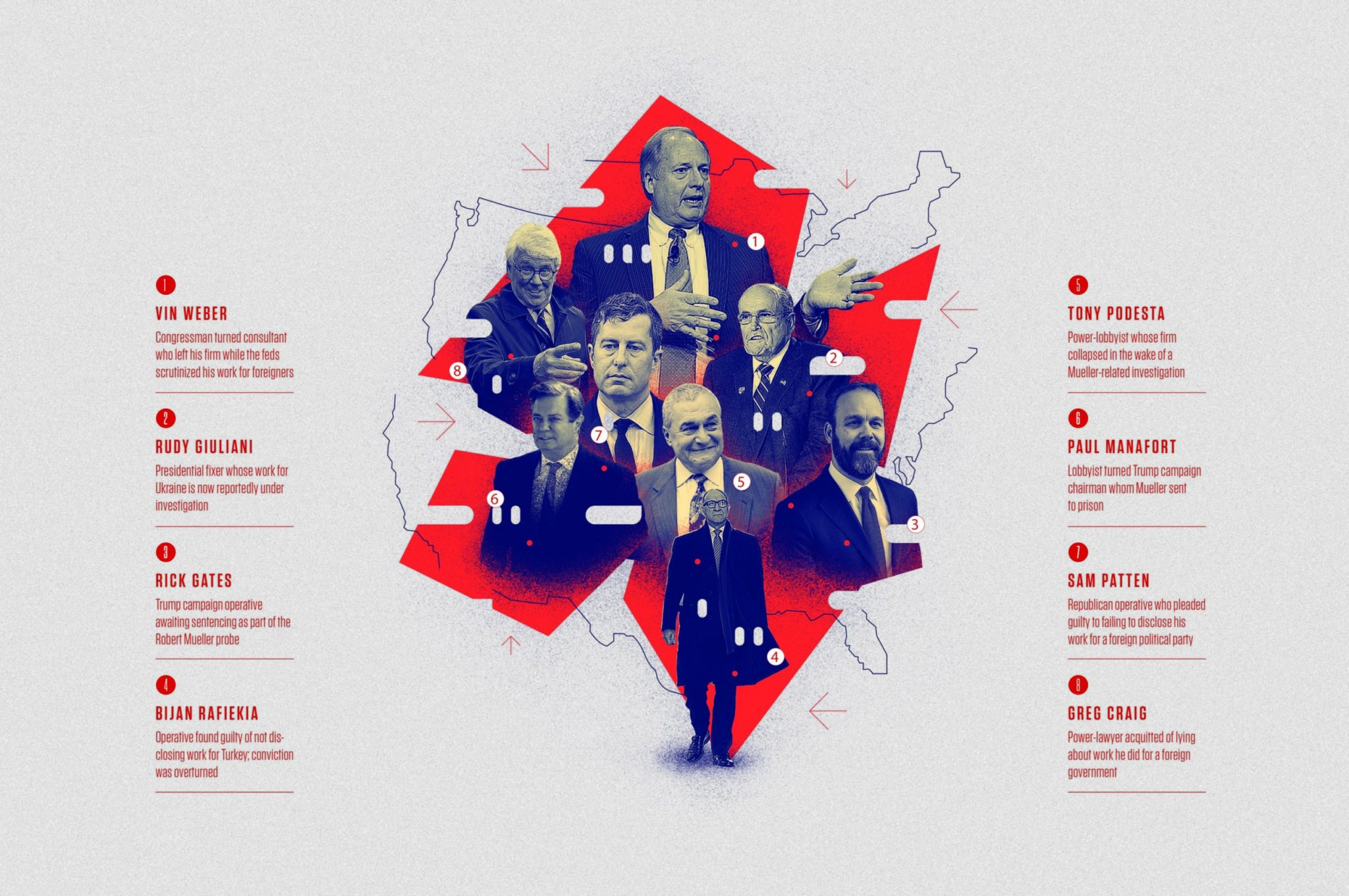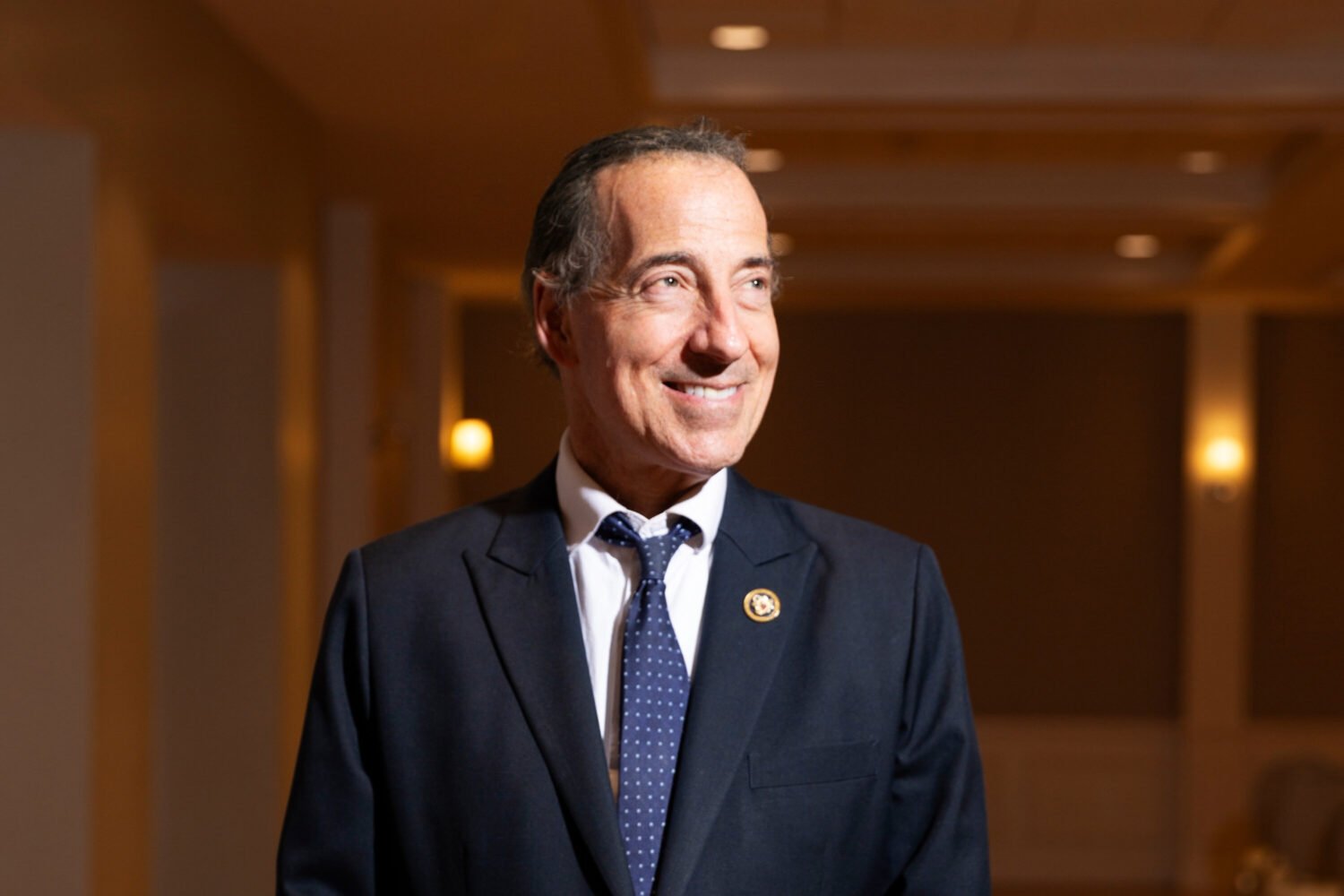Pretend, for a moment, that you’re the leader of a foreign regime. Maybe in the Middle East, or Eastern Europe. Your country is loaded with natural resources, but your autocratic government is a diplomatic pariah—you don’t have a lot of pull in Washington.
The US Congress has just introduced a bill that could derail your economy or make you look weak in the eyes of your people. Maybe the proposal would ban American imports of your most valuable commodity or prevent you from buying arms from US firms. Either way, you’re about to get screwed. You need to make sure the legislation never becomes law. What do you do?
In theory, you could dispatch your ambassador to work things out through traditional diplomatic channels. But your iron fists have made you radioactive at the State Department. Besides, Foggy Bottom doesn’t vote in Congress. So instead you go trawling for a fixer in one of the most flourishing corners of the Washington swamp, the foreign-influence industry.
The deal works like this: You’ll hand over a pile of money to the operatives for a pressure campaign, but you don’t want to leave any fingerprints. If the targets of the lobbying knew that an unsavory regime like yours was trying to influence public policy, they might be less likely to support your cause. So the operatives must keep the contract secret and not disclose it to the federal government. Is it illegal? Sure. But the feds didn’t do much to police this type of scheme for many years—and your connections always jumped for the cash.
This time, though, everybody’s gun-shy. Your inside-the-Beltway contacts aren’t willing to bend the rules anymore, and others won’t touch the job even if it’s conducted aboveboard. The only outfits willing to take your money are little-known players, and even they insist on adding a new wrinkle to the arrangement that obfuscates their involvement. What the heck is going on?
Washington hasn’t been this terrified of foreign tampering with our democracy since World War II. And how can you look away? Special counsel Robert Mueller’s investigation exposed the Kremlin menace that may have helped put President Trump in the White House. The intrigue only ratcheted up from there. Trump’s infamous phone call to Ukrainian leaders has now put Washington at the center of an impeachment spectacle that’s set to consume the country’s attention for the foreseeable future.
All the same, another story about foreign interference is unfolding much more quietly in hometown Washington. Instead of voting booths or electioneering, it features a corner of our local industry that has long catered to overseas actors: that boggy swath of the influence business where foreigners go to hire their Beltway problem-solver.
Before the Mueller probe, few were even aware of this insider economy of lawyers, lobbyists, and consultants representing foreign officials, corporations, and political parties in everyday company-town transactions. What’s more, the business was so poorly regulated that lobbyists routinely agreed to conduct the work in secret, directly violating the law. Washington in turn became home to a thriving black market of foreign-influence peddlers, and overseas entities such as your hypothetical autocrat had no trouble getting underground help to push their agenda.
Then the special counsel dusted off an obscure law called FARA—the Foreign Agents Registration Act—and K Street found itself ensnared in the biggest criminal sweep since the Jack Abramoff scandal in the early 2000s. A pair of Trump associates went down for secretly aiding the enemy. But plenty of people distinctly outside Trump’s orbit have had a hard time, too. High-profile Washington operators including super-lobbyist Tony Podesta, congressman turned hired gun Vin Weber, and Democratic power-lawyer Greg Craig watched their reputations go up in FARA-related flames. A four-letter acronym that went ignored for decades, says one consultant, has “put the fear of God” into K Street.
While it’ll take years for historians to hash out the impact on our democracy as a result of the revelation about Russian meddling, in the day-to-day business of Washington, the Mueller effect is already here. The changes rippling across one of our city’s signature industries have already emerged as the probe’s most tangible legacy.
Few Americans had heard of FARA before the 2016 election. “At that point, I had been handling FARA cases for 15 years,” says Dan Pickard, a partner in Wiley Rein’s international-trade practice, “and I don’t think anyone even in my family was aware what it was.”
The law goes back to 1938, when Congress wanted to stop Nazi and Communist agents from spreading propaganda. But it didn’t apply to the influence industry until after the war, amid Cold War espionage fears. At that point, the Justice Department began requiring anyone trying to shape opinions on behalf of a foreign entity to register his or her work with the government.
Over the next 50 years, as the United States emerged as the world’s sole superpower, the circle of overseas players needing to influence decision-makers in Washington kept expanding, as did the cast of Beltway fixers looking to cash in. An old-school lobbyist might be enlisted for a charm offensive on Capitol Hill, a public-relations executive tapped for an extensive media push. Maybe the situation called for a “grassroots” on-the-ground campaign—in that case, political operatives and consultants were standing by.
FARA is the federal law governing political influence work for foreign actors. It was passed in 1938, but for decades the Justice Department rarely policed it.
There was even a cottage industry of middlemen, the people who could broker connections and contracts between a foreign entity and a DC player. Some of these brokers had law degrees; others had less traditional résumés. According to one consultant, the man who for years hired Washington influence-peddlers on behalf of one overseas interest was a limousine driver: “He used to arrive at meetings in his limo outfit.”
Based on data from the Center for Responsive Politics, foreign principals have spent more than $1.25 billion to shape American policies and opinions since 2017, the first year the center began keeping statistics. But that accounts for only the money that exchanged hands legally—not the cloak-and-dagger deals. And according to insiders, the covert schemes were a bread-and-butter component of the business. Some overseas interests—Saudi Arabia, Russia, Ukraine, the United Arab Emirates, and Turkey, sources say—made the hiring of Washington operatives contingent on their agreement to violate FARA and not register their work with the Justice Department. One rationale for flouting the law is optics. For some foreign heads of state, routing millions of dollars in public funds to Washington lobbyists looks bad; political opponents could lambaste you as a wasteful spender. A bigger consideration is tactical: Americans would naturally be more skeptical of a specific policy agenda if they knew a foreign power were orchestrating it. For a Beltway operative, there are career calculations: Representing a foreign government carries an unpatriotic stench that might knock you out of contention for a high-profile government post in the future. Better to keep the work under wraps.
The incentives might have been different if there had been any concern that prosecutors would crack down, but for many years the feds weren’t paying much attention. The Justice Department division that was responsible for enforcing the statute had a tiny staff and, unlike other units, does not have the power to compel subjects to turn over documents or even answer its questions. Between 1966 and 2015, DOJ brought just seven criminal FARA cases and won only three. “None of us filed FARA back in the day,” says one Washington operative. “Our attorneys never even mentioned it.”
Between 1966 & 2015, the feds charged only 7 people for breaking the law. Meanwhile, a black market thrived.
A Washington media consultant I spoke with told me that, several years back, the FARA unit contacted his firm to conduct a routine examination of the company’s books to make sure it had properly disclosed its foreign-influence work. “I thought, ‘Oh, shit—this is going to be bad,’ ” he said. “Because we had some [overseas] clients that we hadn’t registered for.” But instead of inspecting all of the firm’s clients, the FARA official allowed the operative to handpick a selection of its work for review. So when the official showed up for the examination, the operative simply turned over the files for the clients that were properly registered and left the documents for the illegal work on the shelf.
Not only did the FARA bureaucrat fail to detect any of his firm’s wrongdoing, he even suggested that it could deregister a couple of its clients. Says the operative: “It was a joke.”
As Mueller lifted the veil on this illicit economy, this once-laughed-at team of lawyers and bureaucrats instantly became the supporting actors of the biggest news story in the world.
The FARA cases they made showed the work was so lucrative that it attracted operators from the top to the bottom of Washington’s food chain. Paul Manafort and Rick Gates—the DC operatives who’d worked on Trump’s campaign—were nabbed for running a secret $60-million effort to drive support in the media and on Capitol Hill for Ukrainian interests. Now federal prosecutors are reportedly looking into whether Trump lawyer Rudy Giuliani’s work in Ukraine, when he was not registered as a foreign lobbyist, violated FARA. (Giuliani has denied breaking the law.)
Enter the 2016 election, which cast a spotlight onto the dark corner of the swamp.
Even the white-shoe players are getting caught. In early 2019, Skadden, Arps, Slate, Meagher & Flom, a prestigious New York law firm with a big presence in Washington, agreed to pay a settlement of more than $4.6 million, admitting that it misled DOJ about its communications with the press after it produced a report for the Ukrainian government.
At the same time, DOJ muscled up its foreign-influence unit by increasing its staff, stepping up its overall inspection of advocacy firms and other influencers, and hiring one of Mueller’s former prosecutors to run the unit. The new regime sent Washington lobbyists racing for their attorneys. “My phone was ringing off the hook,” one lawyer in private practice told me. “After the indictments came out, I got a new FARA client probably every day for a couple months.”
Lawyers quickly realized that the laissez faire days were over. Ron Oleynik, of Holland & Knight, says the relationship used to be “collaborative more than prosecutorial.” He could call up members of the FARA unit at DOJ for informal guidance on his clients’ issues—“it wasn’t adversarial necessarily.” Today such camaraderie is long gone. K Street is subject to the toughest FARA enforcement regime Washington has ever experienced. Since 2018, federal prosecutors have charged more individuals and entities with FARA-related crimes than they had over the prior 50 years.
Since 2018 alone, DOJ has indicted more than a dozen people and businesses on FARA violations.
Which isn’t to say the feds have completely drained the swamp. They lost badly earlier this year in the FARA-adjacent case they brought against Craig, a former White House counsel to Barack Obama turned Skadden attorney. He was the partner who wrote the report for which the law firm took the $4.6-million hit, and he was ultimately acquitted on a felony charge involving his outreach to a newspaper about the work. Less than a month later, a federal judge overturned the conviction of Bijan Rafiekian, Michael Flynn’s onetime business partner, who had previously been found guilty of a FARA violation and a related crime. The same day, Podesta and Weber said the Justice Department had decided to drop a criminal probe into their lobbying work for Ukraine, ending long-running speculation about whether they would be indicted. Podesta’s lobbying firm had shut down in 2017, and Weber had left the consulting firm where he’d been a partner.
Nevertheless, the Mueller effect is real. FARA registrations have increased sharply, as lobbyists and consultants become increasingly vigilant about making sure their work is aboveboard. By the end of the year, the agency expects the registrations to have doubled from 2016 levels. “And that,” says John Demers, the DOJ official who oversees the FARA unit, “is how we measure success.”
This is K Street, though—an industry created to find ways around political obstacles. For every new set of reforms that follows the latest scandal, there’s a new set of loopholes to be exploited by the savviest operators. “They adapt,” says American University professor and lobbying expert James Thurber, “and they adapt immediately.”
Remember the much-heralded provision enacted after the last big lobbying scandal, the one that prevents lobbyists from buying meals for lawmakers? To sidestep that 2007 law, lobbyists began letting politicians cover their own food tabs—and then began writing them campaign checks of far greater value. Or Obama’s celebrated ban barring lobbyists from serving in his administration? That 2009 executive order effectively christened an era of shadow influence: Many Washington operators deregistered as lobbyists, started calling themselves consultants, and went about trying to influence public policy in ways that didn’t meet the strict legal definition of “lobbying” and required no disclosure.
You can already see it happening, as foreign-influence operatives are testing new tactics to get around the beefed-up FARA regime. “If Saudi Arabia comes to you with a big bag of cash,” one such operative says, “you’re not going to tell them to go f— themselves.”
One tactic used with increased frequency today is offshoring. An operative told me he was recently approached by a foreign power—which he refused to name—offering him a lucrative deal for media-influence work that came with a single, familiar stipulation: He was not to register the contract with DOJ. Given the heightened scrutiny of the industry, the operative said he refused to conduct the work himself. Instead, he referred the contact to a British firm and received a cut of the deal as a finder’s fee. It’s unclear whether this arrangement is legal—overseas efforts to influence the American press on behalf of foreign principals falls into one of FARA’s gray areas. Regardless, Washington influencers say the maneuver has become more and more common. “It’s all being offshored,” one consultant says. “Globalization is even getting us now.”
This article appears in the December 2019 issue of Washingtonian.

![Luke 008[2]-1 - Washingtonian](https://www.washingtonian.com/wp-content/uploads/2017/10/Luke-0082-1-e1509126354184.jpg)







